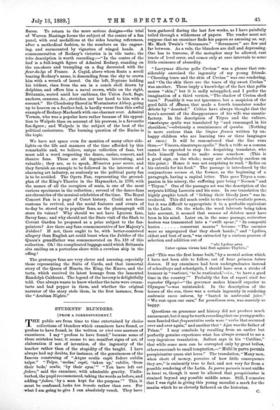T . public are from time to time entertained by choice
collections of blunders which examiners have found, or profess to have found, in the written or vied voce answers of examinees. I say "profess to have found," because some of these mistakes bear, it seems to me, manifest signs of art, of -elaboration if not of invention, of the ingenuity of the teacher rather than of the stupidity of the taught. I have always had my doubts, for instance, of the genuineness of the famous construing of " Atque oculis capti fodere cubilia talPo." ra1P2, moles,' =pH, taken up,' cub-ilia, 'from their beds,' ocu/is, 'by their eyes." "You have left out fodere," said the examiner, with admirable gravity. Undis- turbed, the pupil recommenced, taking the words as before, and adding " fodere, 'by a man kept for the purpose." This, it must be confessed, looks ben trovato rather than Iwo. For -what I am going to give I can absolutely vouch. They have been gathered during the last few weeks, as I have painfully toiled through a wilderness of papers. The reader must not suppose that an examiner finds his papers as amusing as, say, Mr. Mark Twain's "Screamers." " Screamers " are few and far between. As a rule, the blunders are dull and depressing. One has to traverse, if the metaphor may be allowed, vast tracts of level error, and comes only at rare intervals to some little eminence of absurdity.
" Laerymas dilectre pelle Crass)" was a phrase that con- siderably exercised the ingenuity of my young Mende. "Choosing tears and the skin of Cretisa " was one rendering, and "On the skin there are the tears of thy sweet Creiisa " was another. These imply a knowledge of the fact that pellis means "skin;" but it is sadly misapplied, and I prefer the imagination of a third version, "The shadow of Cretisa shed tears." Possibly it was not ignorance, but a suspicion of the good faith of 18/neas, that made a fourth translator render dilecta by "deserted." Critics have always thought that the hero's account of the disappearance of his wife was unsatis- factory. In the description of Tityos and the vulture, rim-at/ague epulis was translated by "and rummaged in his shoulders,"—obviously a reminiscence of epaules. (Nothing is more curious than the lingua franca written by un- happy children who are learning two or three languages at once.) It will be remembered that the line runs thus,—" Viscera, rimaturque epulis." Such a trifle as a comma cannot be expected to stop the despairing translator, who feels himself bound to make sense somehow. (This is a good sign, on the whole; many are absolutely careless on this point.) Hence it was not surprising to read, "Relies on his entrails for his food." The passage is introduced by the conjunctions necnon et, the former, as the beginning of a paragraph, having a capital letter. This gave Tityos a com- panion in his misery, the suffering pair being " Necnon " and " Tityon." One of the passages set was the description of the serpents killing Laocoiin and his sons. In one translation the highly graphic touch of "licking their bloody jaws" was in- troduced. This did much credit to the writer's realistic power, but it was difficult to appropriate it to a probable equivalent in the Latin. On the whole, the word lubricate being taken into account, it seemed that stemma ad delubra must have been in his mind. Later on, in the same passage, sceleratam hada= was transmuted into a "swift spear ;" "In compositi
hostes conserunt manna" became "The enemies were so unprepared that they shook hands ;" and " Lydius, oldest and best of men," was extracted by a curious process of selection and addition out of " ubi Lydius arva Inter opium virum lent ftuit agmine Thybris," and "This was the first house built," by a mental action which I have not been able to follow, out of hanc primum tutare domum. If my examinees had been undergraduates instead of schoolboys and schoolgirls, I should have seen a stroke of humour in " rusticari, to be rusticated,'—i.e., to have a good time in the country." Probably the fun of superi sinit hoc regnator 0/ympi—" the governor makes himself superior to Olympus "—was unintended. In the description of the horses of the sun, there was a certain ingenuity in rendering ambrosia succo saturos, by "basted in ambrosial juice." "We rest upon our oars," for prendimus onto, was scarcely so happy.
Questions on grammar and history did not produce much amusement, but it may be worth recording that one young gentle- man fancied that frequentative verbs were "verbs that occurred over and over again," and another that "Ajax was the father of Priam." I may conclude by recalling from an earlier but perfectly genuine experience what has always seemed to me a very ingenious translation. &Must says in his " Catiline," that while some men can be corrupted only by great bribes, others succumb to small temptation,—" Maki in parva peennia perspiciuntur quam sint levee." The translation, "Many men, when short of money, perceive of how little consequence they are," is eminently true to fact, and not very far from a possible rendering of the Latin. In parva pecunia is not unlike in tenui re, though it must be allowed that perspiciuntur is strained beyond any possible middle sense. Still, I conceive that I was right in giving this young moralist a mark for the maxim which be so cleverly fathered on the historian.
C.


































 Previous page
Previous page